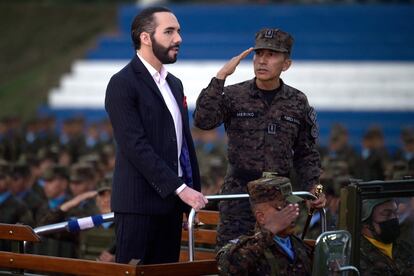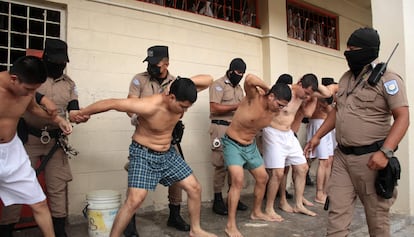El Salvador accused of ‘flagrant’ human rights violations: Torture, arbitrary arrests and deaths in custody
Amnesty International says that President Nayib Bukele is using the state of emergency to criminalize people living in poverty: nearly 2% of the adult population is in prison


One month into a state of emergency approved by El Salvador’s legislative assembly to counter gang-related violence, the country is mired in a serious human rights crisis, according to a report by Amnesty International published this Thursday.
“Over the last 30 days, President [Nayib] Bukele’s government has trampled all over the rights of the Salvadoran people. From legal reforms that flout international standards, to mass arbitrary arrests and the ill treatment of detainees, Salvadoran authorities have created a perfect storm of human rights violations, which is now expected to continue with the extension of the emergency decree,” said Amnesty International.
Gang violence has been a security challenge for a president like Nayib Bukele, who boasts a combative and direct style. According to polls, the 40-year-old president is revered by Salvadorans as a character that is solving everything from poverty and the Covid-19 health crisis to violence.
The legislative assembly approved a state of emergency on March 26 at Bukele’s request after two particularly bloody days in the Central American country, and since then at least 18 people have died in state custody, according to this organization, which also flagged arbitrary arrests, torture and abuse.
“Under the current state of emergency, the Salvadoran authorities have committed massive human rights violations, including thousands of arbitrary detentions and violations of due process, as well as torture and ill-treatment, and at least 18 people have died in state custody,” said the report.
“On the pretext of punishing gangs, the Salvadoran authorities are committing widespread and flagrant violations of human rights and criminalizing people living in poverty.”
More than 35,000 people have been detained in El Salvador since the beginning of the state of emergency, representing 1.7% of the country’s adult population. This has resulted in unprecedented overcrowding in prisons controlled by gangs. At least 1,190 children and teens under the age of 18 have also been arrested. Lawmakers have approved changes to the criminal code that allow prison sentences of up to 10 years for 12-year-old children who belong to gangs, and 16-year-olds can be sentenced to up to 20 years in prison.
The arrests are taking place without any evidence or court orders. Anyone perceived by the authorities as a threat – most of the time the residents of the poorest neighborhoods – can be arrested at will, says AI, “because they have tattoos, are accused by a third party of having alleged links to a gang, are related to someone who belongs to a gang, have a previous criminal record of some kind, or simply because they live in an area under gang control.” The non-profit has “meticulously” documented 28 cases of human rights violations involving 34 people.

The reforms imposed in the country by Bukele, who has just completed three years in power, “have undermined the rights to defense, the presumption of innocence, effective judicial remedy and access to an independent judge,” said Amnesty International.
“Bukele wants to guarantee a constitutional reform that ensures his re-election in El Salvador. The state of emergency allows him to govern in a completely arbitrary way,” said José Miguel Vivanco, a human rights lawyer who spent almost 30 years at the helm of Human Rights Watch.
Bukele's crusade
At the end of March, El Salvador experienced its deadliest weekend so far this century. At least 87 people were murdered between Friday the 25th and Sunday the 27th. An investigation by the digital media outlet El Faro showed that the bloodbath was triggered by a breakdown in a truce agreed between Bukele’s government and the leaders of the nation’s two main gangs: MS-13 and Barrio 18.
Bukele took the military out on the streets in a crusade against anyone who looked remotely like a gang member and granted himself special powers, in a decision strongly criticized by the international community. Days later, the legislative assembly approved a reform of the Penal Code that allows the prosecution of journalists who cover gang-related information. In practice, it penalizes reporters who are critical of the government and present a story about the country’s gang problem that is different from the president’s version.
But the persecution began earlier. “For me, the harassment and intimidation started in August 2021, after revealing that Bukele negotiated with the gangs. Harassment began on social networks: they placed my photos alongside photos of gang members, threatening messages about sexual assault, rape...” said Gabriela Cáceres, one of the journalists from El Faro who brought to light the pact with the gangs.
Tu suscripción se está usando en otro dispositivo
¿Quieres añadir otro usuario a tu suscripción?
Si continúas leyendo en este dispositivo, no se podrá leer en el otro.
FlechaTu suscripción se está usando en otro dispositivo y solo puedes acceder a EL PAÍS desde un dispositivo a la vez.
Si quieres compartir tu cuenta, cambia tu suscripción a la modalidad Premium, así podrás añadir otro usuario. Cada uno accederá con su propia cuenta de email, lo que os permitirá personalizar vuestra experiencia en EL PAÍS.
¿Tienes una suscripción de empresa? Accede aquí para contratar más cuentas.
En el caso de no saber quién está usando tu cuenta, te recomendamos cambiar tu contraseña aquí.
Si decides continuar compartiendo tu cuenta, este mensaje se mostrará en tu dispositivo y en el de la otra persona que está usando tu cuenta de forma indefinida, afectando a tu experiencia de lectura. Puedes consultar aquí los términos y condiciones de la suscripción digital.








































